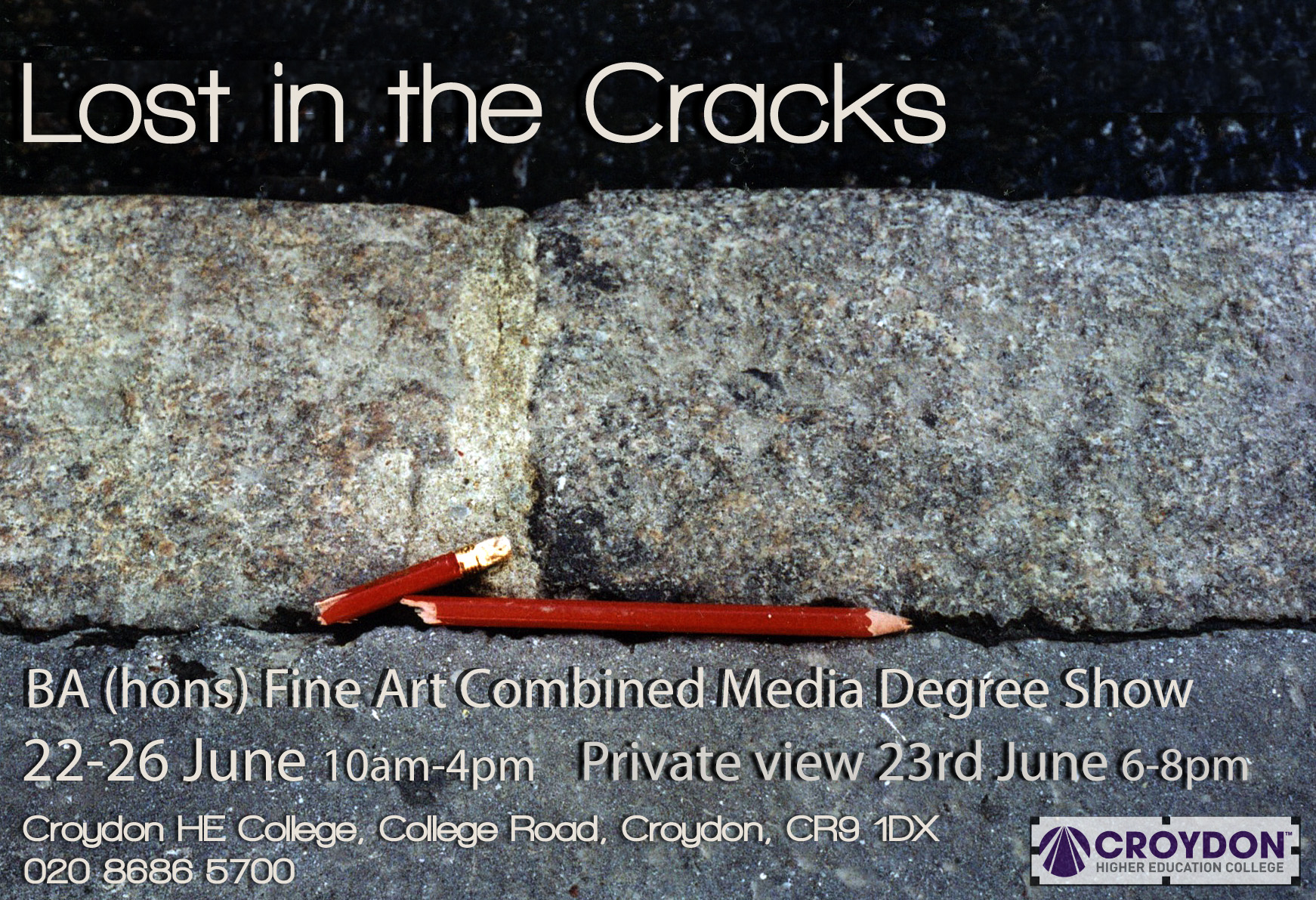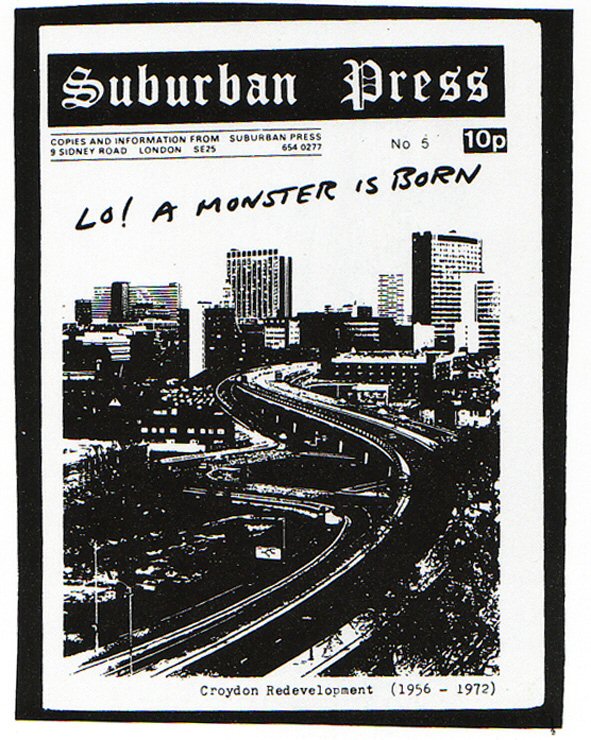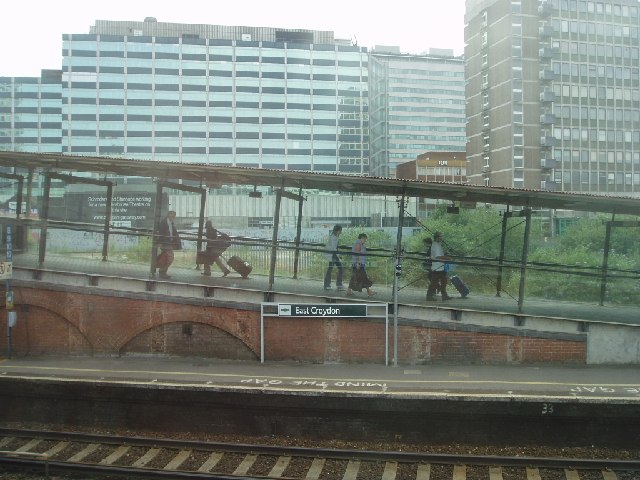I was pretty excited about visiting Croydon last week for the private view of Georgina Cook’s degree show.
As many of you will know I’ve been a great admirer of her photos for many years and was thrilled when she agreed to let us use her images for the first two issues of Woofah (including the front covers).
Recently G’s work has veered away from documenting club culture and concentrated more on abstract images – a display of her psychogeographical love affair with South London.
Indeed her degree show marks a surprising acceleration into an entirely new, more conceptual, area. “Lost In The Cracks” raises many questions regarding place and surveillance society in the early 21st Century. It is apt that the playfully Kafka-esque installation took place in Croydon, which as well as being the birthplace of dubstep (via the Big Apple record shop) was also where Jamie Reid and the Suburban Press collective vigorously attacked the very nature of post-war “new towns” as sites of grim alienation rather than suburban paradises.
Cook’s installation covers a wide area and I was impressed by the dispersed nature of the work. For example I was greeted at East Croydon station by a friendly bureaucrat who informed me that, despite Croydon technically being in Zone 5 of London’s travelcard system, my Oystercard was not valid there and that I would have to pay a twenty quid penalty fare.
Obviously this raises many questions about what (and where) London actually is, as a “place”. The London of our imaginations is many things, far beyond the representation of the railway map or travelcard zones.
So, as Iain Sinclair has pointed out recently, Stoke Newington has an entirely different character to the rest of the London Borough of Hackney. Similarly Croydon exists in some kind of hinterland, both in London and Surrey, but not really characteristic of either. Whilst dubstep is seen by many as originating in London, it is also suburban in character (cf. comments by Simon Reynolds about dubstep precursors ‘ardkore and Jungle having key participants based in the home counties – most relevantly Essex’s Suburban Base label and shop).
Cook’s secondary point is that the very nature of “place” is formed by social processes. These processes include state and corporate interventions both at “national” and “local” levels. East Croydon station is one of the busiest outside of Zone 1, so perhaps the town itself will be forever associated with the railway and its operating company, Southern.
But Cook also reminds us that these interpretations are always subject to negotiation. The smiling bureaucrat was only too eager to inform me that there was a chance that my twenty quid penalty fare would be refunded to me if I appealed. The message I took away from this is that we must resist the imposition of bureaucratic “place” and formulate our own relationships with Croydon, by wandering about ourselves. This is reminiscent of the work done by the Equi Phallic Alliance to undermine notions of “Wessex” generated by reactionary poets.
Indeed, the latter part of Cook’s installation is composed of a semi-guided derive of the area around the station. My invite directed me to College Road, but on entering the college building there I was informed by a second bureaucrat that I was in the wrong place and needed to head to the H.E. College instead. I continued to wander, enjoying the sunshine, ruminating on the role of educational establishments in confining thought. The almost deserted H.E. College provided even less answers. I drifted happily through its corridors, viewing some of the more conventional work by other students.
There was no trace of Georgina Cook, her invisibility only serving to highlight her presence.




Wow! I haven’t been to Croydon for a walk about in more than 25 years… But I’ve been through it on the train or in a car many times in those 25 years. Coming back to London from Brighton a couple of months ago I had to change at East Croydon, and I was thinking then that maybe it would be a good place to live… Close to Gatwick for quick getaways out of the country and easy train access to central London… and I guess Brighton and the beach the other way…. But I’m disappointed to read you got told your Oyster Card was invalid and were slapped with a 20 knicker fine. I hope you appealed and I’d be interested to read the result of this.
The appeal is in!
My sister seems to like it there. Trains go till about 5am as well. Saying that, last time I was there there was this bloody huge punch-up in the train station, with me and this other bloke hiding round the corner, occasionally sticking our heads round to have a peek and report back, like in some 80s film.
omg!! hahaha…. embarrassed * amused * annoyed!! soo many people got lost!! i guess you were behind the anonymous text observing that it was a bit of a labyrinth (damn i didnt update my phone book!). sorry sorry, glad u had fun anyway… can i send u some photos from the show?
http://drumzofthesouth.blogspot.com/2009/07/omg-best-review-of-my-work-ever.html
Wow. I’m suddenly seeing that evening in a whole new light. I thought I was merely lost when I was driving round East Croydon for 45 minutes, going to the wrong college and then getting hopelessly confused in the right one. I hadn’t realised it was a psychogeographical journey, but now I see George was forcing us to confront, in a very real way, the nature of suburban alienation and the concept of being “lost”. I certainly felt I experienced the true essence of Croydon that night, the platonic ideal even – the underpasses, the one way systems, the complete inability to get to one’s destination in a straightforward manner. Very postmodern. What after all IS destination? Should we not resist the false duality of lost/found?
I did finally catch one tantalising glimpse of George and her very fine work. Then when I returned from looking at the other exhibits she was gone – vanished – disappeared. What a master stroke!
In the words of Robert Louis Stephenson, “To travel hopefully is a better thing than to arrive, and the true success is to labour.”
ahahaha LMAO
Hey there,
Can you let me know what you put in your appeal details in regards to the penalty fare? The same exact thing just happened to me today! I know that Croydon uses pay-as-you-go and assumed the extension would be deducted automatically. It wasn’t. I could have gotten through the gates as some blokes were holding them open without checking tickets, but instead of some dishonesty, I told them, look, I need to buy an extension ticket as Oyster didn’t deduct it.
They then said, nope, you get a 20 pounds penalty fare! WTF? I’ve never had a problem with buying extension fares on the end of journey.
Hey LJ, I sent you an email… good luck!
Hi, can you let me know how to appeal the penalty fare, and what the outcome was for you? I’m in the same situation…
My appeal was turned down I’m afraid – they reckon there are signs up everywhere and it’s our responsibility to ensure we have a valid ticket, blah blah blah.
Pingback: UNCARVED.ORG BLOG » BLOG ARCHIVE » UCL URBAN LABORATORY – CREATIVE EDGE: SATURDAY 26 SEPTEMBER